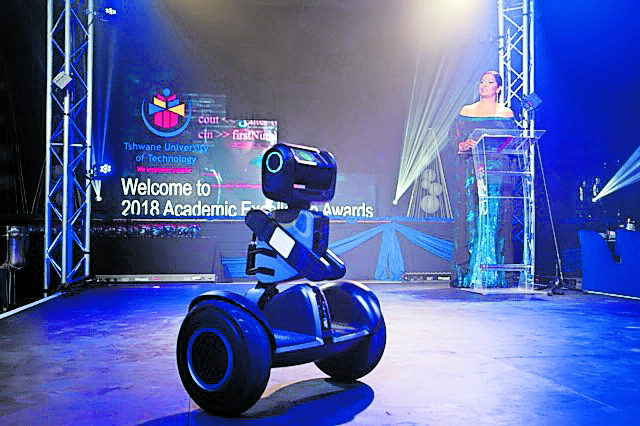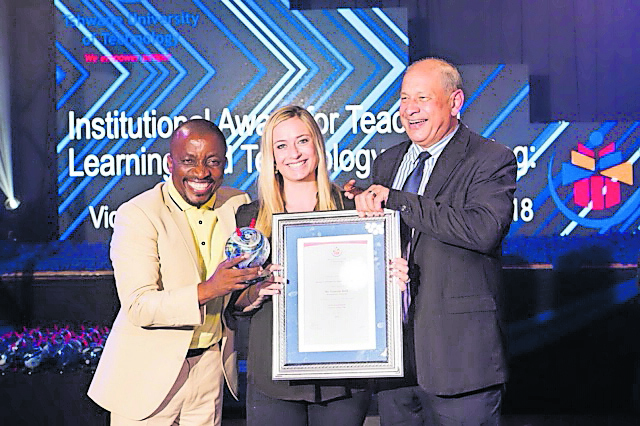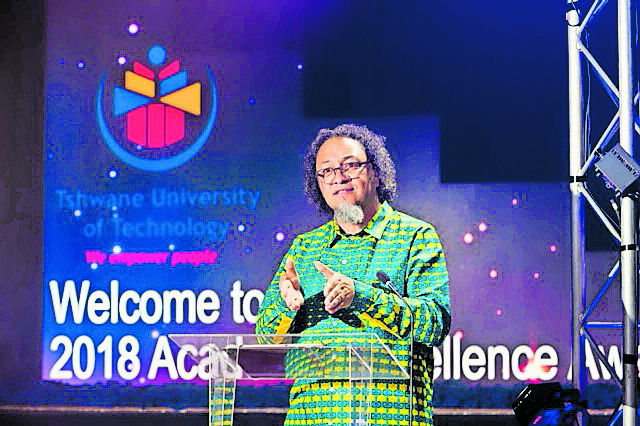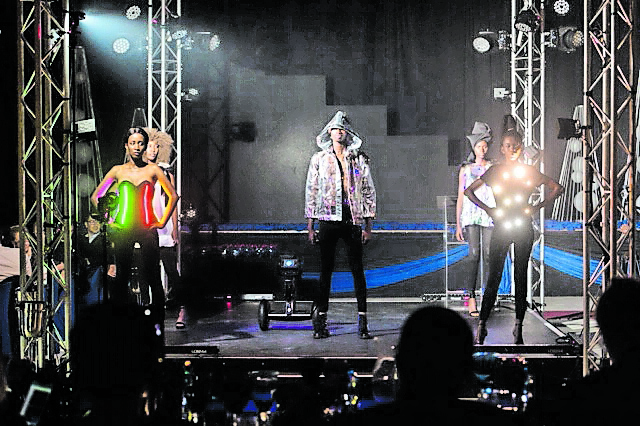The TUT Academic Excellence Awards was held under the them of the fourth industrial revolution
Over the past 15 years, since the merger of three technikons, the Tshwane University of Technology (TUT) has achieved several significant milestones that add to the institution’s history of excellence.
According to Professor Lourens van Staden, TUT’s Vice-Chancellor and Principal, the institution was recently ranked the number one university of technology on the African continent, and the ninth best university in South Africa by the Times Higher Education World University Rankings, which uses global tables across the core missions of teaching, research and knowledge transfer.

It was also graded among the top 1 000 best universities in the world, Van Staden was pleased to announce. “Ladies and gentlemen, TUT should be known as a place where value is promoted and the ‘inventor spirit’ is respected and nurtured,” he said.
Van Staden was speaking at the glitzy annual TUT Academic Excellence Awards held at Theunis Botha Hall in Pretoria, under the theme of The Fourth Industrial Revolution.

The awards ceremony, interspersed with music and a fourth industrial revolution fashion show, presented an opportunity to celebrate innovation, teaching and learning, and saw hundreds of academics and staff members of TUT receive merit awards for their outstanding research work, master’s degrees, doctoral and post-doctoral dissertations.
The more than 100 recipients were from various faculties, but particularly from engineering and built environment, the humanities, science, finance, human resource and transformation and higher education development and support.
Van Staden said the awards were an important marker for TUT to become a global heavyweight and to remain one of the top universities of technology in academia in South Afrca, on the African continent and in the world.

“Tonight, I am honoured and delighted to celebrate and reward our achievements and striving for excellence. Our academic and research staff have remained focused and worked very hard amidst widespread challenges, not only at the university, but also in the higher education sector and country. Your awards tonight speaks volumes about your passion and dedication to your profession and the industry,” he said.
“TUT is definitely not about accepting mediocrity or second-class academic and research performance. We must constantly strive for nothing less than high quality academic and research standards and outputs.”
The Vice-Chancellor said appreciating and rewarding excellence and research was important in higher education, in order to generate a cadre of academics who are able to provide teaching in their respective disciplines. But he warned academics and the university staff members against complacency, and resting on their laurels.
Guest speaker Dr Gillian Arendse, the deputy director of Stellenbosch University, said academics must keep working hard and find lasting solutions to society’s pressing problems. “A comfort zone is a lovely place, but nothing ever grows there,” said Arendse.

“So as we celebrate what we have achieved, we are reminded of the need to keep going. We need to understand that better can never be our best, but we always need to go for good.”
Arendse also advised award recipients to never get complacent, bored or let their egos get the better of them.
“Well done on your achievement, and remember that every professional was once an amateur. Our efforts to grow our disciplines and ultimately our country are grounded in the need to take people with. Continue to tell your story, as that might just be the inspiration that somebody else needs,” he said.
Professor Patricia Popoola, who won the woman researcher of the year and senior researcher of the year awards, said she was extremely happy to be recognised for her hard work and research in the faculty of engineering and built environment.

Popoola, who specialises in the study of metals, said students should take their education seriously and be disciplined in order to achieve their goals and dreams of building a prosperous South Africa.
“I am excited and happy about these awards I received tonight. I like engineering and metallurgy, and always motivate our students to get more education and strive to be the best at what they do,” she said.
Dr Letshego Faith Mashele, who received a doctorate in finance, said it takes perseverance, determination and hard work to excel in academia.
“My dissertation was about sustainable procurement and supply chain management at the University of Witwatersrand. It took me more than two years to complete. It was not easy. But through hard work everything is possible,” said Mashele.
“We do need more South Africans to have doctorates and work hard to deliver outstanding research in their respective disciplines.”
Dr Malesela Kekana, who received a doctorate in science, said he grew up in a rural village in Mokopane, Limpopo, “a place of hopelessness and angst-ridden youth”.
“I come from a poor village and that motivated me to show others what can be done. You don’t have to be a product of a Model C school to be where I am today,” said Kekana. “Mathematica was my case study. We investigated if algorithms are accurate and tested them. I am over the moon with our results.”
Professor Stanley Mukhola, Deputy Vice-Chancellor of Teaching, Learning and Technology, said the awards were particularly significant in that they are being celebrated at a time when TUT is grappling with some important educational and vocational questions.
“The questions are around the impact of the anticipated revolutionary changes on our future education systems, our future vocational expectations and the future world of work for our students, as engineered by the dawn of the second digital revolution, also referred to as the fourth industrial revolution by the World Economic Forum,” said Mukhola.
“I know that the excellence awards are given to top performing academics in teaching and learning as well as research effort. Our overall performance in these two competencies over the recent period has resulted in our university attaining international acclaim and standing. This is very important in terms of reputation and is yet another indicator of our commitment to excellence as the largest and foremost university of technology in Africa.”
Dr Thandi Mgwebi, Deputy Vice-Chancellor of research, innovation and engagement, said as part of its research, innovation and engagement strategy, TUT has to maintain and grow its status. To achieve this, the university council has approved a total of R25.2-million for internal grants, which will be awarded based on research excellence.
“Of this total, R12.6-million is for three research platform awards and R12.6-million for 10 early career development awards. These are to attract senior academics and develop early career and emerging researchers,” said Mgwebi.
“The aim is to retain and attract young post-doctoral researchers mentored by leading academics in established laboratories, while concomitantly, allowing these postdoctoral researchers to mentor and supervise students at master’s level.”
Van Staden said great things were happening at TUT regarding its research, innovation and academic excellence. “TUT is certainly moving towards new heights, which is confirmed by its recent rankings.
“However, it must be remembered that there is no time for complacency or self-satisfaction regarding our achievements. We must continually reach for the stars in our research endeavours.”